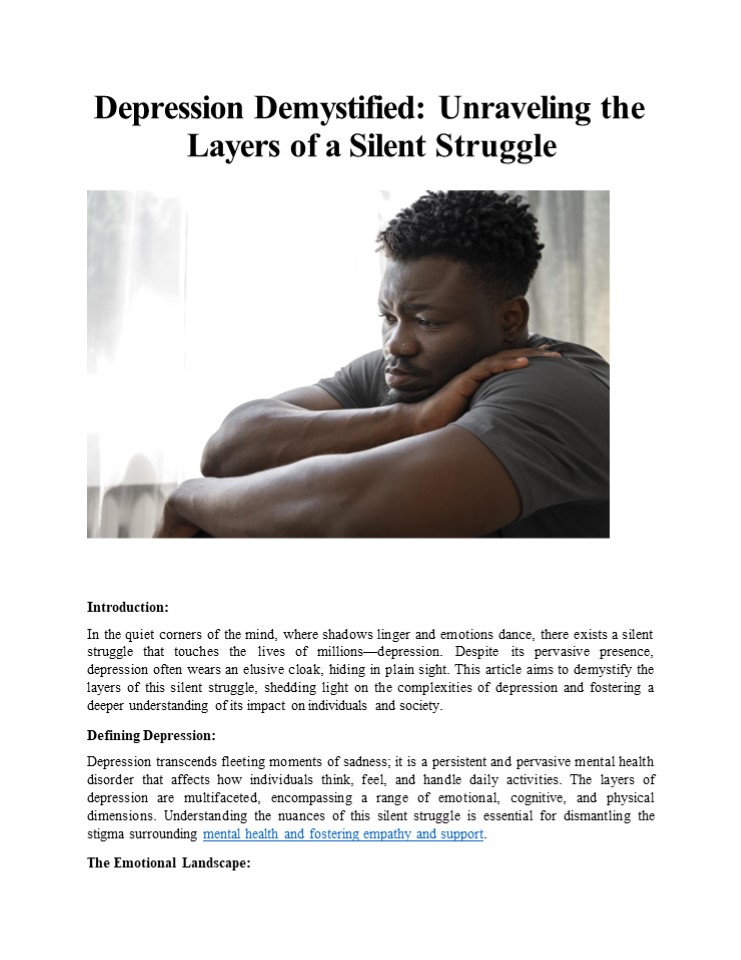Depression Demystified: Unraveling the Layers of a Silent Struggle - PowerPoint PPT Presentation
Title:
Depression Demystified: Unraveling the Layers of a Silent Struggle
Description:
In the quiet corners of the mind, where shadows linger and emotions dance, there exists a silent struggle that touches the lives of millions—depression. Despite its pervasive presence, depression often wears an elusive cloak, hiding in plain sight. This article aims to demystify the layers of this silent struggle, shedding light on the complexities of depression and fostering a deeper understanding of its impact on individuals and society. – PowerPoint PPT presentation
Number of Views:0
Title: Depression Demystified: Unraveling the Layers of a Silent Struggle
1
Depression Demystified Unraveling the Layers of
a Silent Struggle
Introduction In the quiet corners of the mind,
where shadows linger and emotions dance, there
exists a silent struggle that touches the lives
of millionsdepression. Despite its pervasive
presence, depression often wears an elusive
cloak, hiding in plain sight. This article aims
to demystify the layers of this silent struggle,
shedding light on the complexities of depression
and fostering a deeper understanding of its
impact on individuals and society. Defining
Depression Depression transcends fleeting
moments of sadness it is a persistent and
pervasive mental health disorder that affects how
individuals think, feel, and handle daily
activities. The layers of depression are
multifaceted, encompassing a range of emotional,
cognitive, and physical dimensions. Understanding
the nuances of this silent struggle is essential
for dismantling the stigma surrounding mental
health and fostering empathy and support. The
Emotional Landscape
2
At the heart of depression lies an
emotional landscape marked by profound
sadness, hopelessness, and a pervasive sense of
emptiness. Individuals grappling with depression
often experience a loss of interest or pleasure
in activities that once brought joy. Emotions
become a turbulent sea, difficult to navigate,
leaving individuals feeling isolated in their
struggle. Cognitive Distortions Depression
weaves a distorted tapestry of thoughts,
influencing how individuals perceive themselves,
the world, and the future. Negative thought
patterns, known as cognitive distortions, become
ingrained, leading to a self-reinforcing cycle of
despair. Thoughts such as self-blame, excessive
guilt, and a distorted sense of worth contribute
to the layers of cognitive challenges individuals
face. Physical Manifestations Depression is not
confined to the realm of the mind it manifests
in the body as well. Fatigue, changes in appetite
and sleep patterns, and unexplained aches and
pains are common physical manifestations of
depression. The mind-body connection underscores
the holistic impact of depression on an
individual's well-being.
Unraveling the Layers Social Stigma and
Isolation One of the layers that shroud
depression is the pervasive social stigma
attached to mental health struggles.
Misunderstandings and judgment often leave those
grappling with depression feeling isolated and
reluctant to seek help. Demystifying depression
involves dismantling these societal barriers,
fostering open conversations, and promoting a
culture of empathy and understanding. The Mask of
High Functionality Depression doesn't always
announce its presence with visible signs of
despair. Many individuals adeptly wear a mask of
high functionality, going about their daily lives
while concealing the silent struggle within.
Recognizing that depression can hide behind a
façade of normalcy is crucial for dispelling
stereotypes and encouraging authentic
conversations. The Intersection of Biological
Factors Biological factors, including genetic
predispositions and alterations in brain
chemistry, contribute to the layers of
depression. Understanding the intersection of
biology and mental health is a key step in
unraveling the complexities of depression. This
recognition informs both medical and therapeutic
interventions, tailoring treatments to address
individual needs. Trauma and Life Experiences
3
The layers of depression often intertwine with
past traumas and life experiences. Unresolved
trauma can cast a long shadow, influencing
emotional well-being and contributing to the
development of depressive symptoms. Acknowledging
the impact of life experiences is fundamental to
a holistic approach to healing. Cyclical Nature
and Relapse Depression is characterized by its
cyclical nature, with periods of remission and
relapse. Understanding the potential for
recurrence is vital for individuals and their
support networks. It highlights the importance of
ongoing mental health care, resilience-building
strategies, and a compassionate approach to
managing the ebbs and flows of the silent
struggle. Moving Towards Understanding and
Support Educating and Raising Awareness Demystif
ying depression begins with education and raising
awareness. Dispelling myths, providing accurate
information, and fostering open dialogues
contribute to a society that is better equipped
to understand and support those facing the silent
struggle of depression. Promoting Compassionate
Conversations Language matters in the discourse
surrounding mental health. Promoting
compassionate conversations involves choosing
words that uplift rather than stigmatize.
Creating safe spaces where individuals feel
comfortable sharing their experiences is a
crucial step in unraveling the layers of
depression. Encouraging Help-Seeking
Behavior Breaking the silence surrounding
depression requires encouraging help-seeking
behavior. Empowering individuals to reach out for
support, whether through friends, family, or
mental health professionals, is essential for
navigating the journey towards healing. Holistic
Approaches to Treatment Addressing the layers of
depression involves holistic approaches to
treatment. This may include a combination of
therapy, medication, lifestyle changes, and
support networks. Recognizing the
multidimensional nature of depression allows for
personalized and comprehensive strategies for
recovery. Conclusion Depression is a silent
struggle that weaves its threads into the fabric
of daily life, influencing thoughts, emotions,
and physical well-being. Demystifying depression
involves acknowledging its layers, dismantling
stigmas, and fostering understanding and support.
By unraveling the complexities of this silent
struggle, we pave the way for a more
compassionate and inclusive societyone that
recognizes the resilience of individuals facing
depression and extends a hand of empathy and
support.































